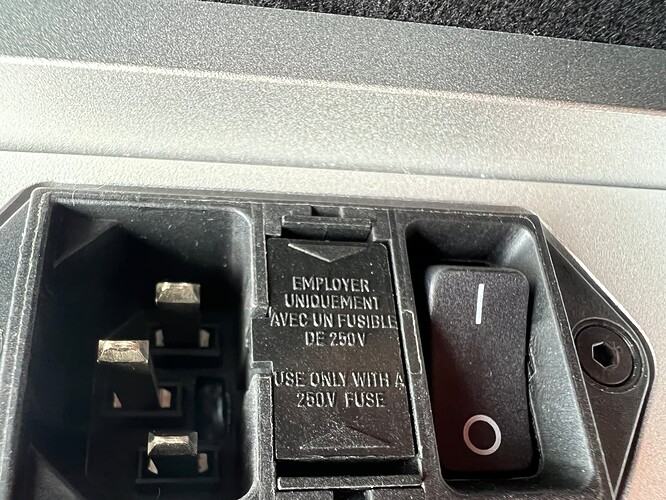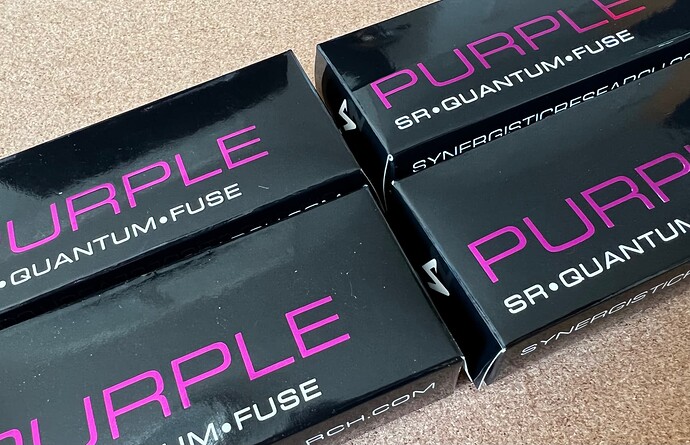Yes. All of it. That is what the rectifier in the power supply does.
Thanks for explaining. So where is the fuse typically located? Is it at the beginning of the DC electrical path, right after the rectifier?
I promise that this is not a facetious question: can someone describe what “better” is with respect to the fuse upgrade being discussed here? I’m interested in a more specific description of what sound parameters are affected by the fuse change. I ask because one person’s “better” can merely be another person’s “different”.
There is no objective factor which makes one fuse “better” then another. All that they need to do is fail when an electrical fault occurs so their electrical rating and provenance is important . However many hold that different fuses can result in changes of sound. These changes can affect all of its parameters or only some. If that is the case is a change necessarily better? That will depend upon the circumstances and listener preferences. So your concluding sentence is a reasonable description of reality except that I would extend it to include the possibility that one person’s “better” may be another’s “worse”.
Very much a “suck it and see” subject.
No, the power supply needs to be protected by the fuse as well. One may think that as we are dealing with a circuit the fuse could be placed anywhere so long as the circuit is disconnected in the case of an electrical fault. However for various safety reasons the primary fuse is placed before the load which means it is normally on the AC inlet line. For dCS equipment you will find that the fuse is physically situated in the mains power receptacle. Of course there may be other protection devices elsewhere in an electrical circuit depending upon the design.
Could a helpful soul please tell me the fuse rating for the Rossini Clock in the U.S.?
The manual just says “20 x 5mm T 1A L” and the rear of the unit says “Use only with a 250V fuse.”
The 250V bit gives me pause, since I’m in the U.S.
Does the Rossini Clock not need a different fuse in the U.S. vs. the UK (230V, remember), for example?
most of audiophile equipment 110 or 240v … use 250v fuse … meaning, Y=you are good. The voltage rating of a fuse is the max voltage you want them to break.
Obviously if the fuse cas break (open) at 250 volts it will also open for 110v.
I confirm no sparks. Nor smoke 
Just delicious sound.
Thank you 
Now using SR’s Purple fuses for Bartok+, Octave’s AMP and HPA4 headamp.
Am enjoying huge improvements of AMP’s sound ballance and DAC’s sound quality. At least 3 - 12hours burn in required before feel those improvements, especially for HPA4.
The inprovements were confirmed with my two friends who have ordered same ones right after this experiment.
Please note this replacement has been done by my own responsibility. This kind of modification may cause serious problems on our systems.
does any one tried upgrade the fuse on the clock? Does it makes as much change as the fuse in the DAC?
I was told that if the equipment (DAC, Clock, server) is connected to a good power conditioner, the risks are limited. Personally, I’ve never had a problem. The power supply is very stable in my home.
Thank you very much for your advice.
Me too!! I haven’t experienced any problems with aftermarket fuses.
I’ve started from lower priced ones.
Now I’m thinking about next upgrade under my own responsibility…
Hi Guys
Can you advise which of these purple fuses are suitable for the Bartok HE?
Also 20mm or 32mm?
Seems relatively obvious but just wanted to check with you guys.
Cheers
It’s a 20mm, but I’m not sure of the rating.
For the standard Bartok it is A 1A T, however this maybe different from the Bartok HE. The manual should tell you, but I couldn’t find a copy of the HE model online.
Thanks I’ll give it a try.
I found the HE manual and it does indeed say the same thing you mention “20 x 5mm T 1A L fuse” so it must be the same and thank you.
The dealer recommended this SR Purple fuse: Slow 3.15A 5x20mm. I have a DCS Bartók HDac. So the one with the power supply has a different fuse than the standard Bartok.
Hi Guys,
The fuse rating to use is also shown on the serial number plate of any of the dCS range.
HTH
Phil

